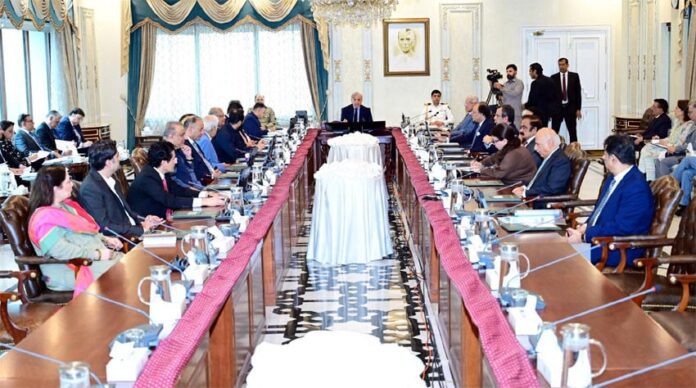The initiative seeks to enhance government performance, optimize human resources, improve policymaking, and minimize delays.
Federal Cabinet Approves Merger of 82 State-Owned Enterprises and Endorses Austerity Measures
ISLAMABAD:
The Federal Cabinet, chaired by Prime Minister Shehbaz Sharif, has given its green light to a significant restructuring initiative involving the merger and dissolution of 82 State-Owned Enterprises (SOEs). This decision comes as part of a broader effort to enhance government efficiency, optimize human resources, and streamline policymaking processes.
During the meeting held today in Islamabad, the Cabinet approved the recommendations put forth by the Rightsizing of the Federal Government Committee. This committee has proposed the consolidation of various SOEs to create more robust and efficient institutions. The aim is to leverage digitization, smart management practices, and transparent governance to better serve the public and improve overall service delivery.
In conjunction with this decision, the Cabinet established a dedicated committee to safeguard the interests of employees impacted by the restructuring. The objective is to ensure that the transition process, involving the merger and dissolution of multiple departments, is handled with sensitivity and fairness toward the affected workforce.
The restructuring of these 82 entities is envisioned to significantly enhance the performance of government operations. The first phase of implementation is already underway, with six ministries initiating the enforcement of the committee’s recommendations. This phased approach is designed to address issues of inefficiency, optimize the deployment of human capital, and eliminate unnecessary delays in decision-making and policy implementation.

The Federal Cabinet was also briefed on recent cost-saving measures, including a notable saving of $130 million achieved by halting the import of urea and ensuring a continuous gas supply to urea manufacturing plants. This move is expected to have a positive impact on the agricultural sector, particularly during the Rabi crop season.
Prime Minister Shehbaz Sharif praised the efforts of the Ministries of Finance, Energy, and National Food Security in securing an uninterrupted supply of urea fertilizer. This commitment is seen as crucial for supporting the upcoming agricultural season and ensuring that farmers have access to essential resources.
In line with the Prime Minister’s vision of fiscal responsibility, the Cabinet received a comprehensive briefing on the implementation of austerity measures aimed at reducing government expenditure. These measures include a voluntary waiver of salaries by Cabinet members, restrictions on the purchase of non-essential government vehicles, and a ban on acquiring new equipment and machinery. Additionally, there will be no creation of new government posts, unnecessary foreign travel at government expense, or medical treatments abroad unless absolutely necessary.
The Prime Minister commended the federal ministries for their adherence to these austerity measures and instructed them to maintain these practices diligently. The aim is to ensure that government spending is managed efficiently and that resources are used judiciously.
In a separate development, the Cabinet strongly condemned recent acts of terrorism in Balochistan and the cowardly attacks on innocent civilians by terrorist elements. A moment of Fateha was observed in honor of the martyred civilians and security personnel who lost their lives in these tragic incidents. The Cabinet emphasized the need for strict and decisive action against those responsible for these attacks, reaffirming the government’s commitment to combating terrorism and ensuring the safety and security of all citizens.
The decisions made by the Federal Cabinet reflect a concerted effort to address inefficiencies within government operations, manage public resources effectively, and uphold the principles of transparency and accountability. The restructuring of SOEs and the implementation of austerity measures are intended to foster a more efficient and responsive government, ultimately benefiting the public and enhancing national governance.


